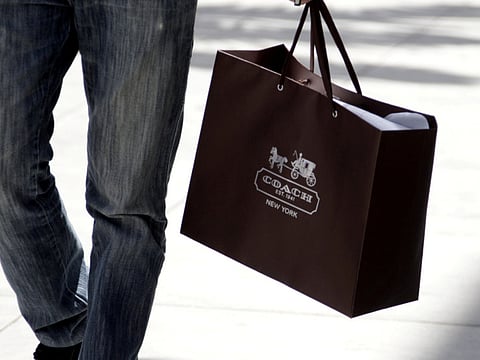Is it cheaper to buy luxury goods in the UAE compared to other countries?
Shopaholics compare deals, buy pre-loved fashion and check out outlet malls to splurge on

Dubai: Personal luxury sales in the UAE and the Middle East has, expectedly, nosedived - but is set to stage a comeback. When it does, how do you turn the tide in your favour in a way that is financially rewarding?
How GCC luxury retail fared in 2020 compared to others
Middle East personal luxury sales were already in decline even before the start of the pandemic. The GCC luxury market is around 3 per cent of the global market and it's been estimated the peak of GCC personal luxury sales was reached in 2015.
However, since 2015, it has been quite sluggish and reportedly decreased between 1-3 per cent every year after that, and the lower point was in 2018 when it reached around $8 billion (Dh29 billion) compared to a global worldwide estimated turnover of $299 billion (Dh1.1 trillion).
2020 offered a glimmer of hope after luxury sales rebounded slightly to an estimated $312 billion globally (Dh1.2 trillion). However, while sales worldwide increased around 6 per cent year-on-year, sales in the Middle East climbed marginally by around 1 per cent to approximately $8.4 billion (Dh30.8 billion).
How enticing is UAE luxury shopping versus its peers?
The UAE has built itself a reputation for being a luxury shopping destination over the last two decades among both local and international visitors, especially from the GCC, Russia, the UK, India and China. Dubai in particular provides visitors with an extensive range of luxury retail offerings, making it one of the most penetrated markets in the world in terms of retail brand presence.
Relatively lower levels of Value Added Tax (VAT) compared to other cities and the provision to claim refund upon departure for tourists makes the UAE lucrative for luxury shopping. For residents, the high discretionary incomes and low tax base make the UAE a shopping haven.
How cheaper is it to buy designer goods in the UAE?
However, is it cheaper to buy luxury goods in the UAE in comparison with other countries?
At a global level, the UAE remains competitive as a luxury shopping destination, particularly in comparison to the rest of the Middle East and North Africa (MENA) region and Asia. Based on research by multiple UAE-based consulting firms, luxury shoppers stand to save money in the UAE.
However, such products are 15 per cent more expensive in the UAE than Europe. Prices of UAE luxury goods are more in line with the US. But, it is still 15 to 25 per cent cheaper to purchase luxury goods in the UAE compared to China, South East Asia, the Indian Subcontinent and MENA countries.
Year-round sales, discount seasons make Dubai attractive
With Dubai hosting several sales throughout the year, they offer brand-conscious residents a chance to buy designer goods at a discount. The luxury market is a key pillar of Dubai’s retail offering.
In further evidence of Dubai’s dominance in the retail and tourism sectors, the city leads the MasterCard global destination cities index, reporting total international visitor spend of $30.8 billion (Dh113 billion) and the highest average visitor daily spend at $553 (Dh2,031) in 2018.
The city’s luxury brick-and-mortar stores are increasingly facing competition from e-commerce channels due to the changing behaviour of younger, cost-conscious and more digitally savvy shoppers. However, these physical stores are seen increasingly adapting to make money digitally, particularly after the pandemic saw online sales surge.
How luxury goods markets will perform in the years to come?
According to research, the region’s luxury market has seen a diverse customer base (beyond Chinese and including tourists from the Indian Subcontinent and Africa – as well as sustained levels from Saudi Arabia). The Saudi consumer is expected to be a key driver of the luxury goods sector, in particular as disposable incomes rise and shopping takes on a larger share of wallet.
Although recent pandemic-related traffic-constraints presented some headwinds in the near term, in particular with tourism traffic into the UAE; in the long term, experts did not see this as a large threat to UAE’s luxury retail market.
Demand for pre-owned goods set to shine further post-pandemic
Brand-conscious UAE residents also shop second-hand designer products from vintage stores such as VestiaireCollective.com, luxurycloset, Riot, etc. There are several reasons why people opt to buy pre-owned items.
Many are attracted to the pre-owned category because it affords access – through a more affordable entry point; the availability of a coveted item; or the confidence to invest in more expensive items, knowing that there will be a market for them should they wish to sell these items in the future.
Pre-loved shopping offers the opportunity to shop sustainably. Millennials care about sustainability, so repurposing goods, such as buying pre-owned, is considered a good thing. In this generation, pre-owned is no longer frowned upon. A lot of people with high incomes and even celebrities enjoy buying pre-loved designer and vintage pieces.
Many believe the appetite for pre-owned watches in the UAE is changing. Although the pre-owned market in the Middle East has not existed in an organised marketplace, but rather among small second-hand dealers, or between collectors where watches have been privately traded - with more legitimate players entering the marketplace, the attitude towards pre-owned has begun to shift.
Sign up for the Daily Briefing
Get the latest news and updates straight to your inbox






